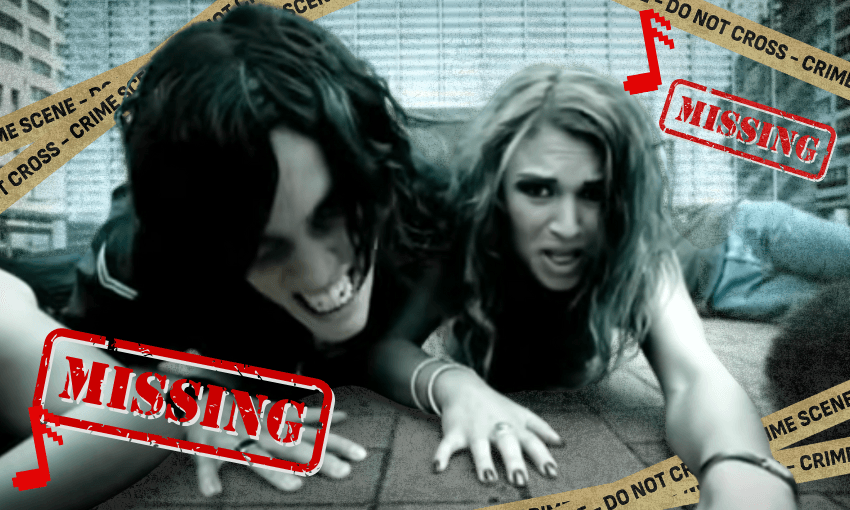One of the stars of New Zealand’s latest police drama tells Sam Brooks how he drew on personal experience for his role, and about connecting with his Irish castmates on set.
On the surface, The Gone looks like yet another cop show, albeit one with an Irish twist. Detectives Theo Richter (the very Irish Richard Flood) and Diana Huia (Acushla-Tara Kupe) team up to find a young Irish couple who have vanished from a small town in the North Island. The series wears its sombre tone like a veil, the detectives have their own interpersonal and internal struggles, and things in this small town are, of course, not always as they seem.
There are a few scenes, and more than a few moments, where The Gone raises its head above the parapet and turns into something quite special, or something weightier. Those moments are often when Buster, played by Wayne Hapi, steps on screen. Buster is the de facto carer for the youth of the town who have found themselves cut off from family or government support. He isn’t quite the heart of The Gone, but he’s the undertow, along with his wife Wiki (played with gusto by Vanessa Rare).
Whenever Hapi is onscreen, you feel like you’re watching something real, something that gets beneath the prestige gloss of the show. The crime at the centre of the show rolls off both character and actor like water off a duck’s back. That might be because the role is very close to Hapi’s own past as a youth worker.
“I’ve worked a lot of years with kids that are exactly in that category”, he says. “The justice system has decided there’s nothing [they] can do with these kids, we’re just gonna lock ‘em up. Just ‘cause it’s too hard.”
“Buster has a real talent for drawing these kids out.”
The main thing for Hapi when he was working with troubled youth in real life was to get young men to open up about what they’re really feeling, although not necessarily in a touchy-feely way. “Like, you’ve gotta know there’s a consequence to actions,” he says. “And that’s what Buster’s about, trying to give these guys, these young people, another chance at life, ‘cause everyone else has given up on them basically.”
Hapi’s journey into acting is the stuff of legend – almost every profile and feature about him mentions him answering an ad at a Dunedin Winz office to audition for a film, which led to another audition, which led to being cast in The Dark Horse opposite Cliff Curtis and being nominated for Best Supporting Actor at the NZ TV and Film Awards that year.
Since then, Hapi has starred in a list of projects that would make any actor jealous – Waru, Whina, Savage – but The Gone is the first time he’s worked with an international cast. As well as Flood, Irish actors Michelle Fairley (Game of Thrones) and Carolyn Bracken (You Are Not My Mother) also star.
Hapi says he quickly forged deep bonds with his three Irish co-stars. “It’s funny, ‘cause I talk to them the way I talk to my relations,” he says. “On a philosophical level, I suppose I was surprised to find that the Irish people and the Māori people have a lot of similar beliefs, as far as being connected to our land, our mountains, our oceans and our ancestors.”
“It was like we’d known each other for years.”
There’s one particular moment from the shoot that sticks with Hapi, when the script called for him and Richard Flood to hongi. The actor, unfamiliar with the concept, asked, “Is that the nose thing that you guys do?”
Hapi offered to practise before they actually shot it, and run him through exactly what he was going to do – take Flood’s hand, put his other hand on Flood’s shoulder, pull him in, touch foreheads and noses, and breathe together.
“He got really, really emotional. He was beside himself, started crying, didn’t know where all these emotions were coming from.” So Hapi stood with him, and let him stay in the moment for however long he needed. “It obviously affected him in such a strong spiritual way, and that’s the whole point of that whole hongi thing.”
“It’s to feel the connection between two people, because with the hongi, you not only bring yourself, but you’re bringing your family, you’re bringing your ancestor… and his came when I gave him that hongi,” Hapi says. “I could feel something run through him and so could he. For me, that was the most special part of the whole thing.
“We had a great time, but that moment was absolutely poignant.”



